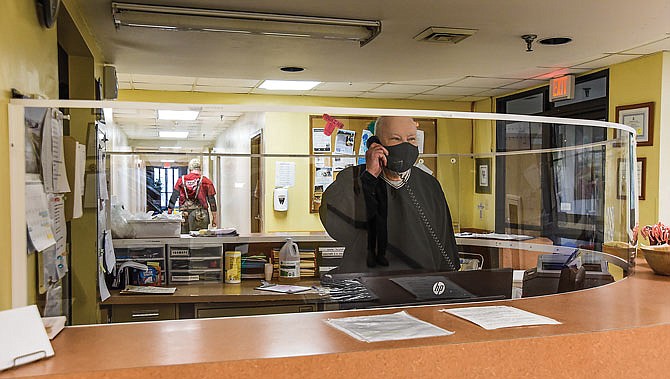Questions have been raised about efforts The Salvation Army is making to prevent the spread of the coronavirus within the Center of Hope shelter in Jefferson City.
The Center of Hope is taking federal and state guidelines or restrictions for dealing with the COVID-19 pandemic very seriously, said Lori Benson, Salvation Army director of community relations and volunteers.
The center provides a shelter for homeless people. It normally offers 31 beds but reduced that to 24 to adhere to social-distancing protocols during the pandemic. It also provides "cold cots" in winter - overnight cots for homeless people to bring them in when conditions are very cold at night - and "hot cots" during the summer, when nights are dangerously hot.
The shelter also provides free meals and acts as a food pantry, as well as helping residents search for work and permanent housing.
"They are cleaning and sanitizing every day," Benson said. "Everyone (in the shelter) is required to wear a mask."
But Debbie Kuhn, a former Salvation Army kitchen staff member, raised concerns after she came down with COVID-19 and was quarantined. She said the shelter quarantined neither residents nor other staff members.
Administrators at the shelter take quarantining very seriously, Center of Hope Director Brian Vogeler said.
The shelter also takes sanitation seriously. Sanitizing frequently touched surfaces is done multiple times daily, Vogeler said.
Obviously, people can't wear a mask when they are eating or drinking, Vogeler said. But the shelter has also worked at social distancing - separating people by at least 6 feet, he said.
The Salvation Army bought 6-foot-wide round dining tables to assure that people may be separated, he said.
"That's why we lost beds - we had to space them 6 feet apart," Vogeler said.
Sure, there have been challenges, he continued.
People who sit at the round monitor station at the front of the shelter needed to be separated from residents who come and go, but early on during the pandemic, the big box stores ran out of Plexiglas needed to make a curved shield around it.
Instead, the shelter settled on hanging sheets of plastic between residents who come and go and the people who sign them in and out.
It wasn't perfect, Vogeler said, but it served its purpose.
Enough Plexiglas to wrap the monitor station recently became available, Vogeler said. Staff members pitched in and used it to build a surrounding screen around the station.
"That was an undertaking, and that stuff is expensive. So there are barriers now in these common places where people interact," he said.
The center's pantry no longer allows folks to come in and pick up food. It takes food out to them.
When staff are checking temperatures, they go down the hall, knock on doors and check people's temperatures using a forehead thermometer.
The center has hand-washing mandates, Vogeler said.
"It just keeps coming down the pipe," he said.
A lot of the information from the Centers for Disease Control and Prevention is relayed to the Salvation Army Headquarters in St. Louis, he said. And the HQ filters it down to local centers, like the one in Jefferson City.
Many of the changes have come about recently. The most recent one was that everybody has to wear a mask and take temperatures twice daily, he said.
He pointed out that some of the changes, such as only providing meals "to go," came about months ago, as it became apparent social distancing was necessary to prevent spread of the virus.
The center tries to observe requirements laid out by health officials as quickly as possible.
But the first response is, "OK, how do we change and do that?" Vogeler said. "It's not always easy."
The center, he said, has had to learn to be flexible.
Normally, with "cold cots" - the allowance for additional people to stay in the shelter overnight when temperatures drop below freezing - the center can become more crowded in places.
"We have to spread them out. We have to put some in the kitchen now," he said. "So we have a limited number."
During previous years, the shelter had room for up to 30 people to stay on the cots, placed at the ends of the shelter wings. But, because they are not allowing people who don't actually live in the shelter going into those wings, administrators had to find new places for the cold cots, like the dining area and kitchen. It now only has room for 13 cots.
The center has measured out spaces and marked on its floors with tape where cots may sit and maintain 6 feet between people. The center uses tables and other furniture to divide people. It is supposed to have some rolling partitions, but those haven't arrived.
"Are we perfect? No," Vogeler said. "But I feel like we try."
Balancing efforts to prevent spread of the coronavirus and continuing to serve the community is challenging, he said.
When it becomes necessary, employees are quarantined at home. If people in the shelter need to be quarantined, they are sent to a local hotel for 14 days at the shelter's expense. The hotel is notified there has been an exposure and quarantine is necessary, Vogeler said.
Kuhn contends staff at the hotel told her they have not been notified that people The Salvation Army puts up there are under quarantine. However, a manager at the hotel would neither confirm nor deny they are notified of quarantines.
When staff members require quarantine, The Salvation Army's human resources department is notified, Benson said. County health officials begin contact tracing and help identify when staff may return to work, she said.

